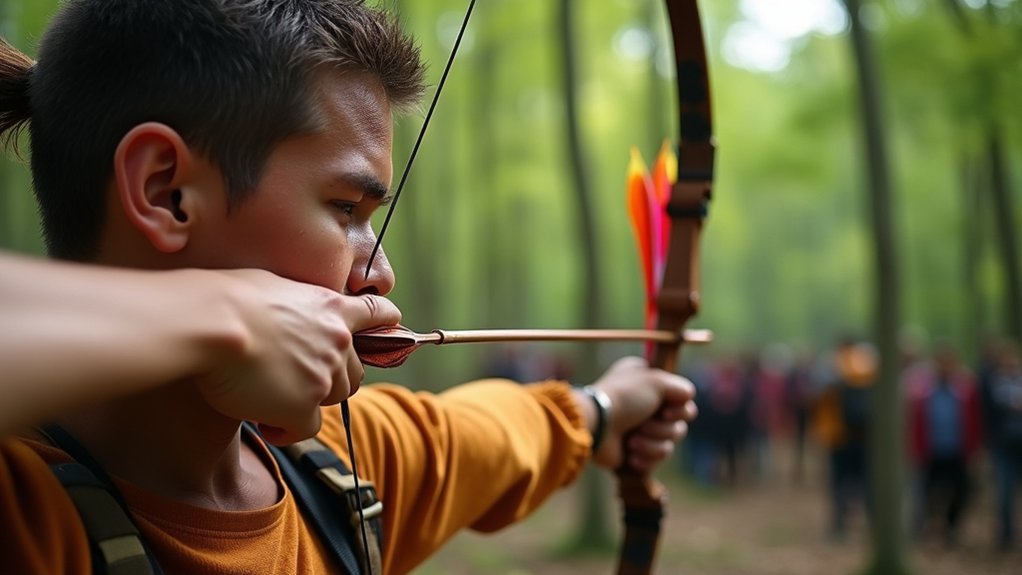Hunting competitions offer a unique way for you to test your skills and push your limits as a hunter. These events cater to all experience levels, providing a platform to showcase your abilities in various categories. Whether you’re a novice or an expert, the thrill of competition can enhance your hunting game. But what exactly do these competitions entail, and how can you get the most out of them? Let’s explore further.
What are Hunting Competitions?
Hunting competitions are thrilling events where participants showcase their skills in tracking and capturing game. These contests vary in format, often including categories like rifle, bow, or shotgun hunts.
You’ll find participants ranging from seasoned hunters to enthusiastic novices, all keen to demonstrate their prowess. Events can take place in diverse environments, from forests to open fields, challenging your adaptability.
Scoring can depend on factors like accuracy, speed, and the type of game hunted. It’s not just about the thrill of the chase; it’s a chance to bond with fellow hunters and appreciate the great outdoors in a competitive atmosphere.
Why Participate in Hunting Competitions?
Participating in hunting competitions can enhance your skills and deepen your appreciation for the sport.
You’ll have the chance to challenge yourself against fellow hunters, pushing your limits and honing your techniques. These events foster camaraderie, allowing you to connect with like-minded individuals who share your passion.
Competing also exposes you to new methods and strategies, broadening your knowledge. Plus, the thrill of competition adds excitement to your hunting experience.
Whether you’re a novice or seasoned pro, these competitions can motivate you to improve and celebrate your achievements in a supportive environment.
It’s a rewarding way to grow as a hunter.
How are Hunting Competitions Structured?
While each hunting competition may have its unique rules and formats, most share a common structure designed to guarantee fairness and excitement.
Generally, you can expect the following elements:
- Registration: Participants sign up, often paying a fee.
- Briefing: Organizers explain rules, safety measures, and scoring.
- Competition: The actual hunting takes place within set time limits.
- Scoring: Points are awarded based on various criteria, like size or quantity.
- Awards Ceremony: Winners are announced, and prizes are distributed.
This structured approach assures that everyone has a fair chance while keeping the competition thrilling and engaging.
What Types of Hunting Competitions Exist?
Competitions come in various forms, each catering to different skills and preferences.
You might find yourself in field trials, where dogs showcase their hunting abilities, or in shooting competitions that test your aim and precision.
If you enjoy tracking, consider participating in tracking competitions that evaluate your skills in locating game.
There are also big game competitions, where hunters compete for the largest or most challenging game.
Finally, you can join small game contests, focusing on smaller animals.
Each type offers unique challenges, so you can choose one that aligns with your hunting style and expertise.
How to Prepare for a Hunting Competition?
Preparing for a hunting competition requires careful planning and practice to guarantee you perform at your best.
To ascertain you’re ready, focus on these key areas:
- Scout the location: Familiarize yourself with the terrain and potential hunting spots.
- Practice regularly: Hone your shooting and tracking skills to boost your confidence.
- Check your gear: Ensure your equipment is in top shape and familiarize yourself with it.
- Stay fit: Maintain physical fitness to improve endurance during the competition.
- Review strategies: Develop and refine your hunting strategies based on your observations and experiences.
With these tips, you’ll be well-prepared for the competition!
What are the Rules and Regulations in Hunting Competitions?
Understanding the rules and regulations in hunting competitions is vital for any participant. Each event has specific guidelines, including permitted hunting methods, equipment restrictions, and designated hunting areas.
You must familiarize yourself with local laws and competition rules, as they can vary considerably. Make sure you know the scoring system, including point values for different game species and penalties for rule violations.
Safety protocols are also important; always wear proper gear and follow firearm safety guidelines.
Finally, respect the environment and fellow competitors to promote fair play. By adhering to these regulations, you’ll enhance your experience and increase your chances of success.
How to Choose the Right Hunting Competition for You?
Choosing the right hunting competition can greatly enhance your overall experience and success.
To find the best fit for you, consider these factors:
- Skill Level: Assess your current skills and choose a competition that matches your expertise.
- Type of Game: Decide which species you prefer to hunt; some competitions focus on specific animals.
- Location: Look for competitions held in areas you’re familiar with or want to explore.
- Format: Select between individual or team competitions based on your preference for collaboration.
- Prizes: Consider what rewards motivate you, whether they’re trophies or monetary incentives.
What Skills Can You Improve Through Hunting Competitions?
While participating in hunting competitions, you can greatly enhance a variety of skills that are essential for both the sport and practical hunting.
You’ll sharpen your marksmanship, developing precision and accuracy under pressure. Your ability to track and understand animal behavior improves, as you learn to anticipate movements and make quick decisions.
Competitions also boost your teamwork and communication skills, especially if you’re hunting in groups. Additionally, you’ll gain valuable experience in traversing diverse terrains and adapting to changing conditions.
